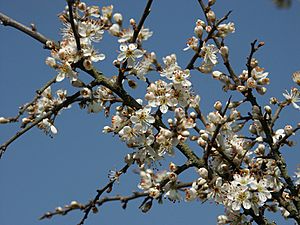Black Down and Sampford Commons facts for kids
| Site of Special Scientific Interest | |
| Area of Search | Somerset and Devon |
|---|---|
| Coordinates | 50°56′15″N 3°15′24″W / 50.93757°N 3.25663°W |
| Interest | Biological |
| Area | 155.2 hectares (1.552 km2; 0.599 sq mi) |
| Notification | 1952 |
Black Down and Sampford Commons is a special natural area covering about 155 hectares (that's like 383 football fields!). It's located in both Devon and Somerset, in the southwest of England. This area was officially recognized in 1952 as a Site of Special Scientific Interest (SSSI).
An SSSI is a place that has been chosen because of its amazing wildlife, plants, or geology. It means the area is very important for nature and needs to be protected. Black Down and Sampford Commons is a "biological" SSSI, which means it's important for its living things, like plants and animals.
Contents
What Makes This Area Special?
Black Down and Sampford Commons is known for having some of the best examples of certain natural habitats. These habitats have grown on the sandy and clay soils of the Blackdown Hills.
Exploring the Habitats
This special site is home to different types of natural environments. These include heathland, which is open land with small shrubs. There's also carr woodland, which is a type of wet forest. And you'll find marshy grasslands, which are wet, grassy areas.
Little Breach Reserve
Part of the SSSI is called the Little Breach reserve. This area has grassy heathland on sandy soil. You can also find some blackthorn bushes and birch trees here.
The Little Breach reserve is especially famous for its many different kinds of butterfly and moth species. It's a great place to spot these beautiful insects!
Heathland and Grasslands
The heathland at Black Down and Sampford Commons is very important. It supports many tiny creatures, like invertebrates. These are animals without backbones, such as insects and spiders. You'll find a huge variety of butterflies here, and spiders are especially common.
Amazing Wildlife
This site is also very important for birds. Many birds that like to live in heathland areas can be found here. It's a key spot for them in the region. The mix of different habitats means lots of different animals can find a home here.
 | Charles R. Drew |
 | Benjamin Banneker |
 | Jane C. Wright |
 | Roger Arliner Young |


